
Monday, July 31, 2006
Thursday, July 27, 2006
We Didn't Teach Them to Write for This
Israeli girls write messages on shells ready for firing towards Hezbollah targets in Lebanon (from news.bbc.co.uk).
Wednesday, July 26, 2006
Servers, Me and the GST
 So I’ll start briefly by asking, has anyone really noticed a difference with the GST being 1% less now?
So I’ll start briefly by asking, has anyone really noticed a difference with the GST being 1% less now? It was a bit of a headache for the manager at a Harvey’s in Barrie (with whom I discussed the change in tariff while in cottage country on the Canada Day weekend), but apart from him, no one’s really expressed their glee and gratitude to Mr. Harper for lessening our burdensome levy.
And if no one really has noticed, why didn’t we just leave the GST at 7% (adding up that 1% of what Canadians purchase in a year makes a huge difference to funding) and keep putting that money back into education, healthcare, social programmes, blah, blah, blah.
My friend Thadd pointed out that one group may notice a difference with the GST reduction: people in the service industry. When leaving a tip at a restaurant, many people use the tax as a guide to tipping since it is 15% of the bill. Having been a server myself, this doesn’t really count as a 15% tip (I know, I know, some reckon you don’t have to tip on tax, but really, that extra dollar change that you’re waiting for means more to me than to you). And now, with the taxes coming to 14%, servers will be out even more cash.
Taxi drivers have managed to circumvent the problem – their totals are tax inclusive, therefore customers will tip on the grand total (although I have heard that cabbies tend to be tipped less of a percentage than servers).
So what does all this mean? Don’t forget to tip your waiter or waitress. They’ve been on their feet all day, running in and out of a hot kitchen (the heat, my god, the heat!) and dealing with obnoxious customers. And if you can afford to go out to dinner, you can afford to tip 15-20% of the entire bill.
(Thanks to Thadd for inspiring this post.)
Tuesday, July 25, 2006
Ramblings from the Rock
 I've just returned from Newfoundland (the only province I hadn't been to), and from there, I bring you this street sign.
I've just returned from Newfoundland (the only province I hadn't been to), and from there, I bring you this street sign.Instead of signs detailing the elaborate rules of parking (now we're in July, and it's between the 1st and 15th - does that mean I can or can't park on this side of the street?) and announcing snow routes (does this count in the summer? how about if the snow has already been cleared? no one seems to heed these signs anyway...), the Newfies post signs banning all from damaging trees.
My tone sounds mocking, but really, I couldn't agree more with the environmentalist Maritimers. How great a city is it (the photo was taken in St. John's) that these are standard issue street signs. And don't even get me started on Last Call. No one was familiar with the term when I asked, because you can drink any time of the day here!
While I'm at it, the scenery is beautiful and they paint their houses in bright colours....

view toward the village of Quidi Vidi

houses on Duckworth Street
Monday, July 24, 2006
All I Really Really Want Is Zigazig Ha...
 In an article entitled “Girl Power as Anarchism”, that appeared in The Guardian on Monday and has now been reprinted in this past Saturday’s Globe and Mail under the title “What Happened to Girl Power?”, John Harris writes about the legacy of girl power, ten years after the Spice Girls’ single “Wannabe” topped the charts.
In an article entitled “Girl Power as Anarchism”, that appeared in The Guardian on Monday and has now been reprinted in this past Saturday’s Globe and Mail under the title “What Happened to Girl Power?”, John Harris writes about the legacy of girl power, ten years after the Spice Girls’ single “Wannabe” topped the charts. Harris claims that despite heavy media criticism and the band being “shot through with absurdity and contradiction…their claim to be waging war on a testosterone-heavy consensus just about held up.” That the Spice Girls were a valid form of feminist thought is an argument I had with many people during those first heady years of Spicemania.
 The Spice Girls were widely criticized for declaring their maxim of “Girl Power” while dressing in revealing outfits and generally not being very cerebral. (I remember reading a Vogue interview where the author gave a list of words that the girls had to have defined during a conversation, one being “sibling.”) The irony of the situation was that critics divorced the women’s sexuality and intrinsic interests from the band’s explanation of Girl Power: we are going to do what we want to do and we’re not going to let men dictate what that is (which is basically a tenet of feminism). Critics wouldn’t let overt sexuality and an interest in fashion exist with feminist thought. But these two things are not mutually exclusive.
The Spice Girls were widely criticized for declaring their maxim of “Girl Power” while dressing in revealing outfits and generally not being very cerebral. (I remember reading a Vogue interview where the author gave a list of words that the girls had to have defined during a conversation, one being “sibling.”) The irony of the situation was that critics divorced the women’s sexuality and intrinsic interests from the band’s explanation of Girl Power: we are going to do what we want to do and we’re not going to let men dictate what that is (which is basically a tenet of feminism). Critics wouldn’t let overt sexuality and an interest in fashion exist with feminist thought. But these two things are not mutually exclusive.Being the feminist that I am, I can’t ignore the fact that many societal factors influence what women perceive as sexy or interesting. I shave my legs because I say I like the way it feels and looks, but really, through many subconscious avenues, I have been told that I like the way it feels and looks. But the basic underpinnings of the Spice Girls’ assertion were that you should feel good about yourself and not let anyone cut you down. Is this way of thinking so inconsequential and enslaved?
Harris mentions in his article that he read “The Whole Woman” by Germaine Greer, published in 1999, “when Spice hegemony was fading fast. ‘The Spice Girls did make a difference,’ [Greer] wrote, ‘because their most passionate fans were eight-year-old girls.’ A study of children's oral culture had found, in the post-Spice climate, that ‘whereas half the space in school playgrounds used to be taken up by a self-selecting group of boys playing football, girls' clapping and dancing games were taking over’.” The eight-year-old girls took on board the message of Girl Power and were putting it into action; and not by becoming part of the male world by playing football. They maintained their interests (just as the Spice Girls maintained theirs, as well as their sexualities), marrying that with a greater sense of self-worth and entitlement.
The Spice Girls are not the voiceless, nameless girls that we see splashed across men’s magazines. They may have dressed similarly to the nameless girls, but their voice was what set them apart. They took their notoriety and influence and changed the thinking and actions of little girls.
And all they really wanted? To “zigazig ha…”
Sunday, July 23, 2006
Bicyclette Quebecois

Faithful readers of this blog will recall a photo of an abandoned bicycle underwater in Amsterdam in a previous post. Here is another abandoned bicycle, this one in Quebec.
Tuesday, July 18, 2006
The View From Here

What is it about the restricted area around the Chernobyl reactor that makes for such despondent photos with dolefully muted colours?
Friday, July 14, 2006
Mongolian Wrestling
Congratulations to those who guessed it - the Guess the Sport II post was a picture of wrestlers waiting to compete at the annual Naadam Festival (in Ulan Bator, the Mongolian capital). The festival coincides with the 800th anniversary of the founding of the Mongol empire by Genghis Khan.
Thursday, July 13, 2006
Panhandling
 Jane Pitfield, conservative and mayoral candidate, is pushing for an anti-panhandling by-law to be read at City Hall. This from a woman who lives the high Leaside life where, if the undesirables of society make it too far up Bayview, they’re quickly shooed back to their Don Valley homes (Open-air bedrooms, complete with surrounding trees and pleasing tarps to keep out the rain. A great fixer-upper option!).
Jane Pitfield, conservative and mayoral candidate, is pushing for an anti-panhandling by-law to be read at City Hall. This from a woman who lives the high Leaside life where, if the undesirables of society make it too far up Bayview, they’re quickly shooed back to their Don Valley homes (Open-air bedrooms, complete with surrounding trees and pleasing tarps to keep out the rain. A great fixer-upper option!). How does panhandling make it to the top of Ms. Pitfield’s agenda of things to change?
I can’t remember a time when someone was rude to me if I did not fulfill their request of a quarter or a loonie. In fact, all I hear these days is the polite phrase: “Thanks anyway, have a good day,” even to people who have whole-heartedly ignored their fellow human’s plea. I once heard a guy, seated comfortably in his SUV, tell a panhandler to get a job. An exchange of words occurred, the panhandler remaining polite and dignified, the SUV driver disintegrating into insults and epithets.
Perhaps it is not an anti-panhandling law we need, but an anti-asshole law. Just as you would politely decline being able to give the time to a fellow human being because you weren’t wearing your watch (and not scold them for being so imbecilic and inept for forgetting to put one on that morning – oh wait, you forgot, too), so should you acknowledge the request, “spare some change?” with eye contact and a polite, “sorry,” instead of ignoring, or worse, chastising the person below you who, “but for the grace of God,” go you.
Wednesday, July 12, 2006
Clapham, July 3rd
 ”Simon!” calls Lyla as she sees him stoop to fit his tall frame through the truncated door.
”Simon!” calls Lyla as she sees him stoop to fit his tall frame through the truncated door. He sees her and smiles, nodding slightly and comes over, his eyes flitting self-consciously to the table of girls who have noted his entry with stares and whispers.
“Hello!” he says warmly, receiving the embrace that Lyla has offered, half-standing out of her chair.
She holds him a moment too long, protecting him, perhaps. He is still her sweet Simon: innocent and unknowing, struggling to figure out his place in this world. Although the sunglasses he places on the table are ten times the price she has ever paid for a pair. She can’t quite see him in the light that most people do, especially the table of girls who are surreptitiously trying to get Simon in the viewfinder of their camera phones.
“It’s like a bloody fishbowl,” says Lyla, not moving her lips in a lazy attempt at her own surreptitiousness as Simon sits down and leans in to hear her.
“Yeah, well, I know,” says Simon, unsure if he wants to get into another discussion about his newly-found fame.
“So, how are you?” asks Lyla, sensing his hesitation, eager also to return to the distilled form of normalcy the two friends now inhabit.
“Good, good,” says Simon. “I’m off for a week in France with Charlotte.”
“Ooo! Whereabouts?”
“Down near Toulouse – we’ve found – “
“Excuse me…”
It’s one of the girls from the table. She is grinning and can’t be more than 16 or 17 years old. Lyla and Simon look up toward her.
“Are you Simon from Seafish?” she asks, her made-up eyes eager and focused on Simon.
“Er, yes, I am,” he says, casting a quick glance at Lyla, who smiles slightly and then looks at the table.
“Can I have your autograph?” She offers Simon a pen and a journal, white with pink flowers on the covers, the first half of the blank pages covered with snippets of writing in different hands.
“Sure,” says Simon, taking the journal and finding the next blank page. “What’s your name?” He looks up at her, eyebrows raised.
“Charlotte.”
“Ah. Same as my girlfriend’s,” he says, and Charlotte giggles, receiving the closed journal and pen when he is finished.
“Thanks,” she says, raising her shoulders to her ears, still grinning.
“No worries,” says Simon, grinning back.
“Bye!” she says, backing away slowly.
“Bye,” says Simon.
“Bye,” says Lyla, after the girl has turned away and is walking swiftly back to her fold.
Simon and Lyla watch her until she sits, the heads of the other girls forming a tent around the journal. Simon and Lyla turn back to each other. They exchange a look that is half-quizzical, half-surprise, which then dissolves into a shared snicker.
“Right,” says Simon, “Where were we?”
Tuesday, July 11, 2006
Guess the Sport II

These participants are waiting to compete in which event (and in which country if you're feeling sporting)? First correct answer receives a replica pair of briefs, worn in the photo.
Friday, July 07, 2006
Thoughts from Terry
 "It's like, sometimes you go to a party, right, and everyone's all fuckin' loaded and you're not loaded, so you go up to people and you're like, how's it going and they're like, woooo!!! And then you're like, ya, okay; and you're trying to talk a bit and they're fuckin' loaded and then you realize the only way to keep going is to catch up to them. So you shotgun a few and then you get good and pissed right away."
"It's like, sometimes you go to a party, right, and everyone's all fuckin' loaded and you're not loaded, so you go up to people and you're like, how's it going and they're like, woooo!!! And then you're like, ya, okay; and you're trying to talk a bit and they're fuckin' loaded and then you realize the only way to keep going is to catch up to them. So you shotgun a few and then you get good and pissed right away."FUBAR, 2002
Thursday, July 06, 2006
The Pub Quiz
 I was first introduced to the Pub Quiz on Wednesday nights at the King's Head pub in the English village of Battle while spending a year working overseas. I was still in an American-tourist state of finding everything in Britain romantically quaint, so sitting in a low-ceilinged, 600-year-old building was new and exciting. I paid my quid’s entry fee and started the first of 5 rounds on all manner of topics. This became an almost weekly event, my team winning the competition only once. When we won, we only got about five pounds apiece, but it was the weekly title of Pub Quiz Winners that was so coveted.
I was first introduced to the Pub Quiz on Wednesday nights at the King's Head pub in the English village of Battle while spending a year working overseas. I was still in an American-tourist state of finding everything in Britain romantically quaint, so sitting in a low-ceilinged, 600-year-old building was new and exciting. I paid my quid’s entry fee and started the first of 5 rounds on all manner of topics. This became an almost weekly event, my team winning the competition only once. When we won, we only got about five pounds apiece, but it was the weekly title of Pub Quiz Winners that was so coveted.Later, while living in Sydney, Australia, I found another Pub Quiz at the Trinity pub. My knowledge of North American sports teams proved to be an asset to my team of mostly-British backpackers, although one overseas call was made (illegally) to discern the name of the Pittsburgh hockey team (Penguins). My trivia talents were better rewarded at the antipodean quiz night: my team was announced as "Last Week's Winners" twice.
 Upon returning to Canada I was able to sate my thirst for trivia by playing the NTN trivia game that some bars have where you type in answers on a little box with an antenna. But this form of competition lacked the focus, camaraderie and social interactions of a proper pub quiz.
Upon returning to Canada I was able to sate my thirst for trivia by playing the NTN trivia game that some bars have where you type in answers on a little box with an antenna. But this form of competition lacked the focus, camaraderie and social interactions of a proper pub quiz.So I tried to do my own. The only problem was, being a primary school teacher, I wanted everyone to do well and began giving hints and clues and awarding extra points, much to the dismay of some of the more serious participants.
 And now I have discovered a better-organized pub quiz with a better turn-out which runs at the Duke of York pub in Toronto. It is run by Pub Stumpers, a trivia league established in 2004. Upon entry, I noticed quite a specific demographic: participants were university students, the girls clad in trendy retro-80s outfits and the boys in graphic t-shirts and thick-rimmed spectacles. I sat down in my simple jeans and ordered a pint, in anticipation of my brother’s arrival. Surely our collected genepool would see us to the top of the tables.
And now I have discovered a better-organized pub quiz with a better turn-out which runs at the Duke of York pub in Toronto. It is run by Pub Stumpers, a trivia league established in 2004. Upon entry, I noticed quite a specific demographic: participants were university students, the girls clad in trendy retro-80s outfits and the boys in graphic t-shirts and thick-rimmed spectacles. I sat down in my simple jeans and ordered a pint, in anticipation of my brother’s arrival. Surely our collected genepool would see us to the top of the tables.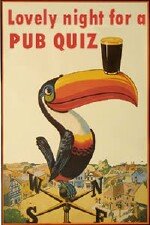 I felt immediately intelligent, easily answering questions like, which animal has the highest blood pressure (the giraffe) and according to the poem, which child is full of woe (Wednesday’s – and I know this because I was born on this sorrowful day). My brother cruised through such queries as Frank Beard is, ironically, the only member of which band to not sport a beard (ZZ Top) and which South American country is named after the Latin word for silver (Argentina). The music round was the most fun, trying to extricate the name and artist from only a few bars of a song. Embarrassingly, I got “I Need to Know” by Mark Anthony and was convinced that a Foreigner song was actually “Join the Joyride” by Roxette. Brother Tim came through with “Video Killed the Radio Star” by The Buggles, which I was sure (along with most of the other contestants) was an A-Ha song.
I felt immediately intelligent, easily answering questions like, which animal has the highest blood pressure (the giraffe) and according to the poem, which child is full of woe (Wednesday’s – and I know this because I was born on this sorrowful day). My brother cruised through such queries as Frank Beard is, ironically, the only member of which band to not sport a beard (ZZ Top) and which South American country is named after the Latin word for silver (Argentina). The music round was the most fun, trying to extricate the name and artist from only a few bars of a song. Embarrassingly, I got “I Need to Know” by Mark Anthony and was convinced that a Foreigner song was actually “Join the Joyride” by Roxette. Brother Tim came through with “Video Killed the Radio Star” by The Buggles, which I was sure (along with most of the other contestants) was an A-Ha song.So, what is it that brings people out to quiz nights? The pursuit of intellectual dominance? The team spirit and co-operation of the contestants? The arguments that erupt over whether a “grimalkin” is a cat or a hamster (it’s a cat)? The excuse to have 3 pints on a Tuesday night?
 All of the above. The pub quiz gives a focus to the night’s events, it provides a goal for revelers to co-operatively strive for, and it supplies conversation starters for people to get to know each other better. The Pub Quiz also has a way of bringing every person in the room together, creating a community of trivia buffs who call out to the Quiz Master and to each other, all in pursuit of that elusive weekly title: Pub Quiz Winners.
All of the above. The pub quiz gives a focus to the night’s events, it provides a goal for revelers to co-operatively strive for, and it supplies conversation starters for people to get to know each other better. The Pub Quiz also has a way of bringing every person in the room together, creating a community of trivia buffs who call out to the Quiz Master and to each other, all in pursuit of that elusive weekly title: Pub Quiz Winners.
Wednesday, July 05, 2006
Avoiding the Paparazzi
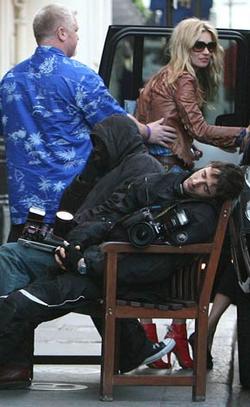
All those celebrities that complain about being hounded by the paparazzi need to become more creative with their avoidance techniques.
Instead of sending out decoys or exiting at the rear of buildings, follow Kate Moss's lead: party until really, really late so that it's early (like 5:45am) and then sneak past the photographers while they're sleeping.
Genius.
Subscribe to:
Comments (Atom)